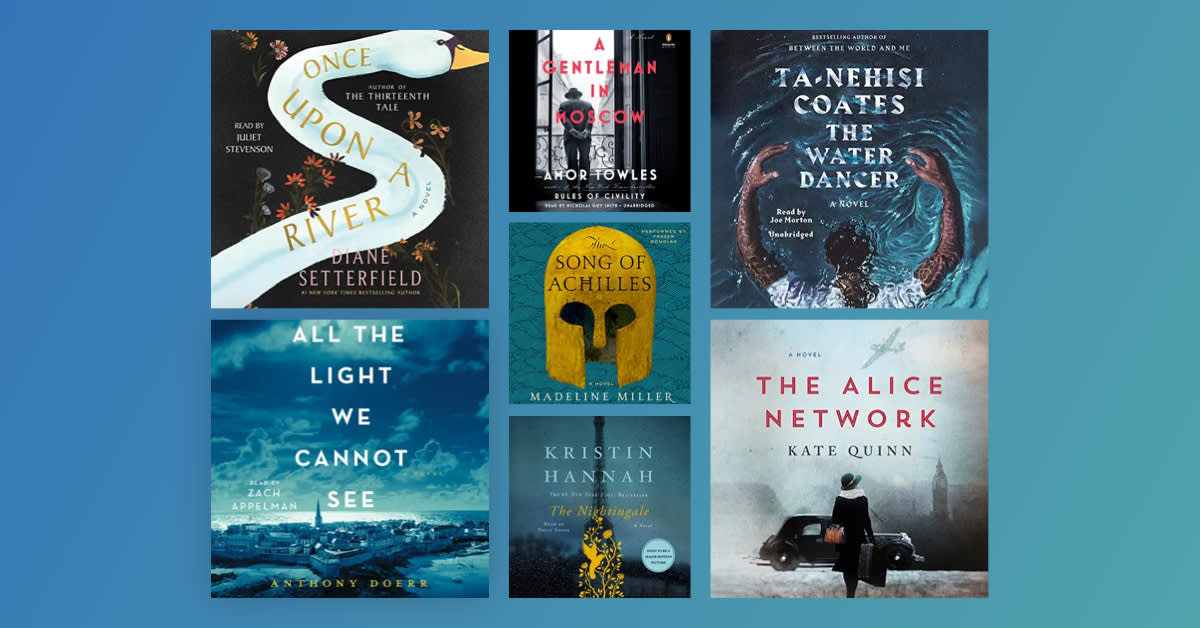This post was originally published on Audible.com.
Often based on real people, events, and scenarios, historical fiction gives us the opportunity to learn about worlds and times we will never experience while introducing fascinating characters and stories set in their midst. Sometimes, the genre can even give us a peek into hidden storylines that routinely go unmentioned in traditional history books, showing us that those of ages past are perhaps not so different from ourselves.
The first in the Kingsbridge series, this rich tapestry of interweaving tales follows the various characters involved in the construction of a medieval cathedral, which makes for a surprisingly fascinating sociopolitical saga. (As one listener put it, this story has as many plot twists as a medieval cathedral has stones.) It also maintains some true-to-life historical touchstones that you can look up for yourself for an idea of how close to reality this work of fiction really is. Though the full audiobook spans more than 40 hours, narrator John Lee’s varied and dynamic performance of each character pulls the listener in and makes the story impossible to pause. More than a few listeners have confirmed that this is one listening experience that’s worth staying up late for.
In terms of award winners, Anthony Doerr’s incredible World War II tale is hard to beat, with a Pulitzer Prize, an Andrew Carnegie Medal for Excellence in Fiction, and an Audie Award under its belt. The unique, heartfelt story splits its time between two main characters: Marie-Laure, a young blind girl whose father is the lockmaster for the Louvre, and Werner, a German orphan whose obsession with a salvaged radio turns into a commendable talent that earns him a place at the Hitler Youth Academy. Through these two young, bright protagonists, each lovingly voiced by Audie winner Zach Appelman, the listener gains a whole new perspective on the unyielding horrors of war and the incandescently bright spots of hope that shine through it.
It’s sometimes easy to overlook the classics because they feel unrelatable and out-of-date, but Gone with the Wind is one that we can confirm is certifiably timeless. It also helps that Linda Stephens’s narration of Margaret Mitchell’s story is so well done that it won an Earphones Award and earned Stephens a nomination for an Audie Award for Best Narration. The plot follows Scarlett O’Hara, a charming young teenager coming of age towards the close of the Civil War. O’Hara, the Southern belle daughter of a wealthy plantation owner, highlights the lapses in morality and detachment from reality that the privileged were afforded during a period of bloodshed while also demonstrating its heroine’s clarity and growth.
This classic is brought to new heights by the impeccable narration of Bernadette Dunne, whose crisp delivery and well-researched pronunciations craft an immersive audio adaptation of this World War II story set in Japan. Memoirs of a Geisha follows a poor young girl’s sale into indentured servitude as a sex worker in a renowned geisha house. Arthur Golden’s vivid writing balances the odd, contradictory environment of imprisonment and luxury in which Nitta Sayuri grows up. Dunne portrays Sayuri’s coming of age with a compelling, elegant performance, presenting the realities of one of history’s most mysterious professions.
For those who feel as though they have examined every literary angle of World War II, The Nightingale by Kristin Hannah offers up a fresh perspective: that of two sisters living under the Vichy Regime in France. Polly Stone gives each of the young women a distinct voice with nuanced tones and accents. Her performance also highlights the differences between the pair. Vianne, the older of the two, approaches her trials with stoic determination while her younger sister, Isabelle, throws caution to the wind both in love and in war. Though neither understands the other, Vianne and Isabelle carry twin spirits of determination and courage as their parallel journeys play out.
Perhaps the most remarkable thing about A Gentleman in Moscow is its paradoxical scope: almost the entire story takes place within the luxurious Metropol hotel, where the aristocrat Count Alexander Ilyich Rostov is under lifelong house arrest following the Bolshevik Revolution. Despite his limited circumstances, Rostov creates a vibrant life for himself, filling his days with intellectual pursuits, fastidiously kept routines, and a healthy interest in the quirks and behaviors of the hotel’s staff and patrons. As the bounds of his inner life expand, so does the scope of the story, which ultimately encompasses more than 30 years, multiple love affairs, the adoption of a wayward child, a war of wills with a standoffish hotel employee, and seemingly countless adventures in miniature. Amor Towles is known for his beautiful, almost musical prose, and Nicholas Guy Smith’s rich and refined narrative performance helps every sparkling moment of this gem shine.
Kate Quinn is a master when it comes to giving a voice to the women whose stories went largely overlooked by the male-dominated authors of historical record. Paired with her favorite narrator, the skilled and multi-accented Saskia Maarleveld, The Alice Network is perhaps one of her best and most captivating audiobooks. Taking place across timelines set before and after World War II, it begins in 1915 when Eve Gardiner is tapped to leverage her linguistic skills as part of an underground network of female spies living among Nazi officers on behalf of the Allies. Decades later, she’s living as a recluse, haunted by her past and silencing her memories with liquor and solitude. That’s until an equally headstrong young American arrives on her doorstep in the aftermath of the war, asking about a cousin who went missing in occupied France. Together the pair set off on a journey through the country and through history as they both look for answers to their own personal mysteries.
Richard Armitage is perhaps one of the most versatile narrators in the audiobook industry, and it is only someone with his breadth of emotive talent who could perform this complex, heartbreaking, and largely true story of Lale Sokolov, a Slovakian Jew who is captured and forced to tattoo his fellow prisoners at Auschwitz-Birkenau. Lale falls in love while tattooing a young woman named Gita, and begins using his limited leverage in the camp to offer her as much safety and comfort as possible. When he is moved to another camp just days before the Soviet liberation of Auschwitz, he escapes and vows to find Gita—with no information but her name. Remarkably, this is Heather Morris’s debut novel. The fact that it was snapped up almost instantly to be sold in more than 40 countries should serve as a testimony to how captivating a story it is.
The river mentioned in this title is the Thames, and the story begins one night in a pub on its banks, when a man bursts in holding a lifeless girl in his arms. When the girl miraculously regains consciousness hours later, she is mute and therefore cannot communicate any facts about her identity. As the mystery endures, three families express separate wishes to adopt her. Juliet Stevenson’s gentle lilt carries the layered narrative through the process of untangling the mystery of the young girl who seemingly came back to life. Along the way, the small community uncovers a whole host of unexpected secrets that had been lying dormant among them all along.
Set in a small town against the historical backdrop of the Mexican Revolution, The Murmur of Bees begins with the discovery of an abandoned infant, left under a bridge and covered in bees. Adopted by a pair of farmers, the boy’s bees remain with him as he grows older, discovering along the way that he possesses a supernatural power to see the future. This is the first of renowned Mexican author Sofia Segovia’s works to be translated into English, and it is magnificently done; the dual narrators capitalize on the writing’s slowburn pace to imbue each character and plot point with meticulous detail. As one listener puts it, the result is an experience that allows listeners to feel, smell, [and] hear each character, each season, each anguish.
What many ancient works lack is language and perspective truly relatable to a modern audience, which is why Madeline Miller’s retelling of The Iliad from Patroclus’s point of view is so positively gripping. The familiar story of the Greeks at Troy is fleshed out in refreshing detail, characterizing the boyishly headstrong Achilles, the dangerous and vain Agamemnon, and the downright overbearing goddess Thetis with fully fledged personalities and mannerisms. What’s more, narrator Frazer Douglas doesn’t hold back in unleashing his acting chops for the entire cast of incredibly varied characters, expertly transforming his narration into a one-man show that makes this feel more like a performance by a full cast.
This selection covers a portion of history that many American listeners might be unfamiliar with: the complicated relationship between Japanese and Korean society in the early 1900s. It follows Sunja, the Korean daughter of farmers who becomes pregnant during an ill-advised affair and must marry a poor minister and move to Japan. The sweeping family saga encompasses multiple generations, tracing the characters at their best and at their worst. With Allison Hiroto’s skilled narration accenting the breaks in time and location that divide up the story, its broad scope feels manageable, soaring through each of the decades and countries featured in this powerful story.
Alison Weir, a historian who turned her eye toward fiction, wields her expertise to bring an additional level of depth and detail to her series, Six Tudor Queens. The first of the collection features Katherine of Aragon, the first and most vilified wife of King Henry VIII. As a Brit and an accomplished actress, Rosalyn Landor makes it easy to believe her performance—not just as Katherine but also as all those she interacts with, from her handmaidens to Henry. For anyone hoping to gain a more realistic glimpse into the life of one of the most influential queens in European history, Weir’s fictional reimagining does an excellent job of conveying Katherine of Aragon’s personality, politics, and everything in between.
The many relationships and surrounding intrigue of King Henry VIII have been the subject of so many books, TV series, and films that they could form their own canon. But it’s with good reason: the heir-less king’s life was absolutely fraught with personal and political chaos that rippled out into English government and society, to both great and tragic ends. Hilary Mantel’s particular perspective on the era focuses on the impact of Henry’s political foil, Thomas Cromwell, and his entry on the scene. Thanks to the thrilling theatrical performance of narrator Simon Slater, Cromwell and the king and other familiars, like Thomas Moore and Cardinal Woolsey, each have their own voice here, all of which are rich with personality. Listening to these men jockey for power is a transportative experience that drives home the anxiety of life in a society governed by a system that could fall apart at any moment.
It is virtually impossible to accurately convey the massive scope of Yaa Gyasi’s debut work, which traces the lives and descendents of two half-sisters born into decidedly different fortunes in 18th-century Ghana. Dominic Hoffman’s fluid, well-paced narration helps keep the listener on track as the plot spins out in myriad directions across more than 200 years. Gyasi’s characters move in and out of scenes set against a changing background that includes the early Ghanian Wars, American slavery, the Civil War, the Great Migration, and early 1900s Harlem. Astoundingly, not a single character or setting is any less detailed for the magnitude of content Gyasi seeks to fit into her narrative; the story is both sweeping and masterfully crafted—which is why it’s no surprise that it won the Audie Award for Literary Fiction in 2017.
Though perhaps best known for her memoir Eat, Pray, Love, Elizabeth Gilbert is a fictionalist at heart, and her talents are on full display in this glittering, scandalous romp through the 1940s world of New York City theater. The story focuses on Vivian Morris, a college dropout who moves in with her theater-owning aunt and embarks on an adventure of personal discovery, aided by the cast of flamboyant characters that occupies her new artistic world. With Blair Brown’s delightfully performative narration illuminating the drama like lights on a stage, Vivian’s story puts the listener directly into the heart of the most interesting part of the best city in the world.
Wild Swan introduces listeners to the Lady with the Lamp long before she became a legend. In this poignant story, a young woman has just discovered her divine purpose to become a nurse, and struggles to make that dream a reality. Over the course of a few short years, Florence remains brave and determined in the face of all obstacles, pursuing her passion against her family’s wishes. From her parent’s luxurious countryside estate in England to her travels abroad to the German medical institute where she first began her training and fell in love with her work, we follow Florence during these pivotal early years of her extraordinary life.
Colson Whitehead’s The Underground Railroad took the literary world by storm when it was released in 2016, and The Nickel Boys follows in the same tradition. Another listen on our list that's based on a real story, Whitehead’s narrative follows a pair of boys enrolled in a reform school called the Nickel Academy in a segregated part of Florida under Jim Crow. Main character Elwood draws heavily on the words of Martin Luther King Jr. for strength in maintaining an attitude of radical kindness and love—a contemplation accented perfectly by narrator JD Jackson’s rich, dignified tone—even as it becomes apparent that the school is actually a lawless prison staffed by evil and abusive officials. His friend Turner, on the other hand, grows hardened by cynicism as their trials endure, and their diametrically opposed attitudes result in decisions and behaviors that will go on to define their lives.






















